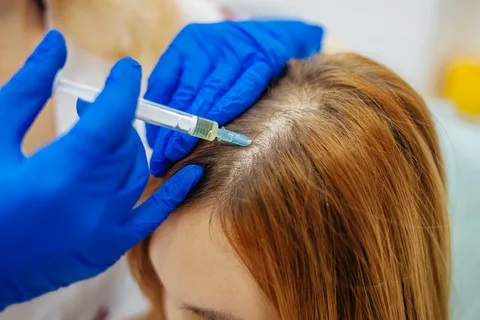Postpartum hair loss is a common concern for new mothers in Islamabad, affecting both appearance and confidence. Fortunately, Exosomes Hair Therapy In Islamabad has emerged as an innovative solution for women struggling with hair thinning after childbirth. This non-surgical therapy harnesses the body’s natural regenerative abilities to stimulate hair growth and restore healthier, fuller hair. In this blog, we will explore how exosomes therapy works, why it is ideal for postpartum hair loss, and the benefits it offers for women in Islamabad.
Understanding Postpartum Hair Loss
After childbirth, many women experience a significant amount of hair shedding. This condition, known as postpartum telogen effluvium, typically occurs due to hormonal changes:
- Drop in Estrogen Levels: During pregnancy, high estrogen prolongs hair growth. After childbirth, estrogen levels fall, causing hair to enter the shedding phase.
- Stress and Fatigue: Caring for a newborn can be physically and emotionally demanding, further contributing to hair loss.
- Nutritional Deficiencies: Pregnancy and breastfeeding can deplete essential nutrients needed for healthy hair growth.
While postpartum hair loss is usually temporary, some women may experience prolonged thinning or slow regrowth, prompting them to seek more advanced treatments.
What Is Exosomes Hair Therapy?
Exosomes are small extracellular vesicles derived from stem cells. They contain growth factors, proteins, and signaling molecules that stimulate hair follicles, encourage cell regeneration, and promote hair growth.
Exosomes Hair Therapy involves delivering these vesicles directly into the scalp through microinjections. By targeting areas of thinning and dormant follicles, the therapy helps restart the natural hair growth cycle, improve hair density, and enhance hair quality.
How Exosomes Therapy Helps with Postpartum Hair Loss
1. Stimulates Dormant Hair Follicles
After childbirth, many hair follicles enter a resting phase. Exosomes therapy reactivates these follicles, encouraging them to resume normal growth and reduce excessive shedding.
2. Strengthens Existing Hair
Exosomes not only promote new growth but also improve the health and strength of existing hair. Women often notice thicker, shinier, and more resilient hair after treatment.
3. Safe and Non-Surgical
Unlike hair transplant surgery or chemical treatments, exosomes therapy is non-invasive and involves minimal discomfort. This makes it a safe option for new mothers, especially those concerned about recovery time.
4. Quick and Convenient
Sessions are typically short, lasting 30–60 minutes, allowing women to fit treatments into busy postpartum schedules without disruption.
The Procedure Step-by-Step
Exosomes therapy for postpartum hair loss is straightforward:
- Consultation: A hair specialist evaluates the scalp, hair density, and postpartum hair loss patterns.
- Preparation: The scalp is cleansed, and a topical numbing cream may be applied.
- Injection: Micro-needles deliver exosomes into the scalp, targeting areas of thinning and dormant follicles.
- Aftercare: Patients receive guidelines to ensure optimal results, including gentle scalp care and protection from harsh chemicals or sun exposure.
Most women require 2–4 sessions spaced a few weeks apart, depending on the severity of hair thinning.
Benefits for Postpartum Women
Natural Hair Regrowth
Exosomes therapy promotes the body’s natural hair regeneration process, leading to natural-looking, fuller hair.
Minimal Discomfort
The procedure is virtually painless, and topical numbing cream ensures maximum comfort during injections.
No Downtime
Women can resume normal activities immediately after treatment, making it ideal for new mothers.
Long-Lasting Results
With proper care and follow-up sessions, exosomes therapy offers durable benefits, reducing the risk of future thinning and improving scalp health.
Enhanced Confidence
Restoring hair density and improving hair quality can significantly boost self-esteem, helping postpartum women feel more confident in their appearance.
Who Can Benefit from Exosomes Hair Therapy?
Exosomes therapy is suitable for postpartum women who experience:
- Excessive Shedding: Significant hair loss within months after childbirth
- Slow Regrowth: Hair that is not recovering naturally after six months postpartum
- Thinning Hair: Noticeable reduction in hair volume or density
- Stress-Related Hair Loss: Shedding due to physical or emotional postpartum stress
It is important for women to consult with a hair specialist to determine the most appropriate treatment plan based on their hair condition and overall health.
Comparing Exosomes Therapy with Other Treatments
Exosomes vs. PRP
Platelet-rich plasma (PRP) therapy uses the patient’s own blood to stimulate hair growth. While effective, PRP may provide slower results compared to exosomes due to the lower concentration of growth factors. Exosomes deliver a higher potency of regenerative signals, promoting faster and more consistent hair follicle activation.
Exosomes vs. Topical Treatments
Topical treatments like minoxidil can help with hair thinning but require long-term use and may cause scalp irritation. Exosomes therapy offers a more natural and targeted approach, minimizing side effects and supporting healthier hair regrowth.
Expected Results and Timeline
Women can expect visible improvements within a few weeks of treatment. Initial results often include reduced shedding and healthier scalp condition. Significant hair density improvements typically appear after 2–3 months, with optimal results observed after 3–6 months. Maintenance sessions may be recommended to sustain long-term benefits.
Aftercare Tips
Proper aftercare maximizes the effectiveness of exosomes therapy:
- Avoid washing hair for 24 hours after treatment
- Refrain from chemical treatments like coloring or perming for several days
- Protect the scalp from excessive sun exposure
- Follow any additional instructions provided by the hair specialist
These measures ensure the growth factors in exosomes work efficiently to stimulate hair follicle regeneration.
Long-Term Benefits
Exosomes therapy not only addresses postpartum hair loss but also strengthens hair for the future. Long-term advantages include:
- Stronger, more resilient hair follicles
- Improved hair thickness and density
- Enhanced scalp health
- Boosted confidence and overall satisfaction with hair appearance
Women in Islamabad are increasingly choosing exosomes therapy for its effectiveness, safety, and convenience, making it a trusted solution for postpartum hair loss.
Conclusion
Postpartum hair loss can be distressing, but Exosomes Hair Therapy In Islamabad offers a non-surgical, safe, and highly effective solution for new mothers seeking to restore hair density and quality. By reactivating dormant follicles and supporting natural hair regrowth, exosomes therapy provides long-lasting, transformative results.
 WhatsApp Us Now
WhatsApp Us Now







